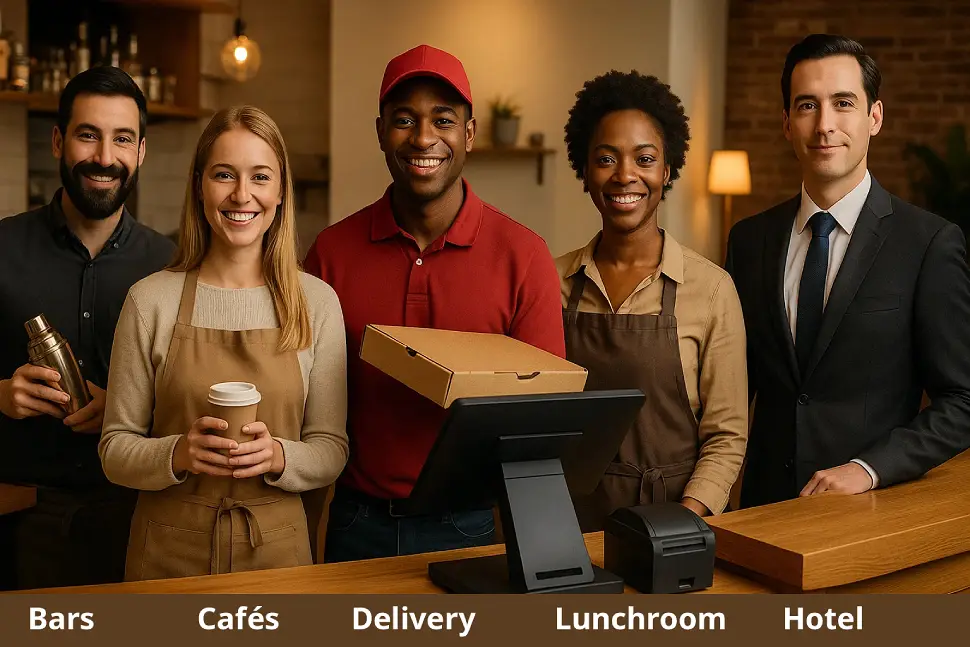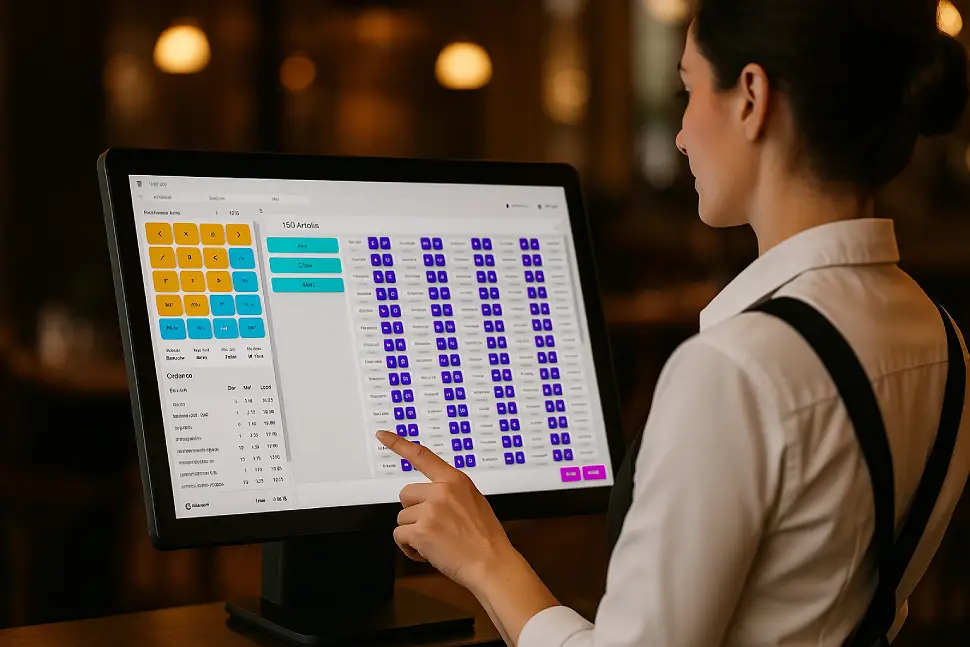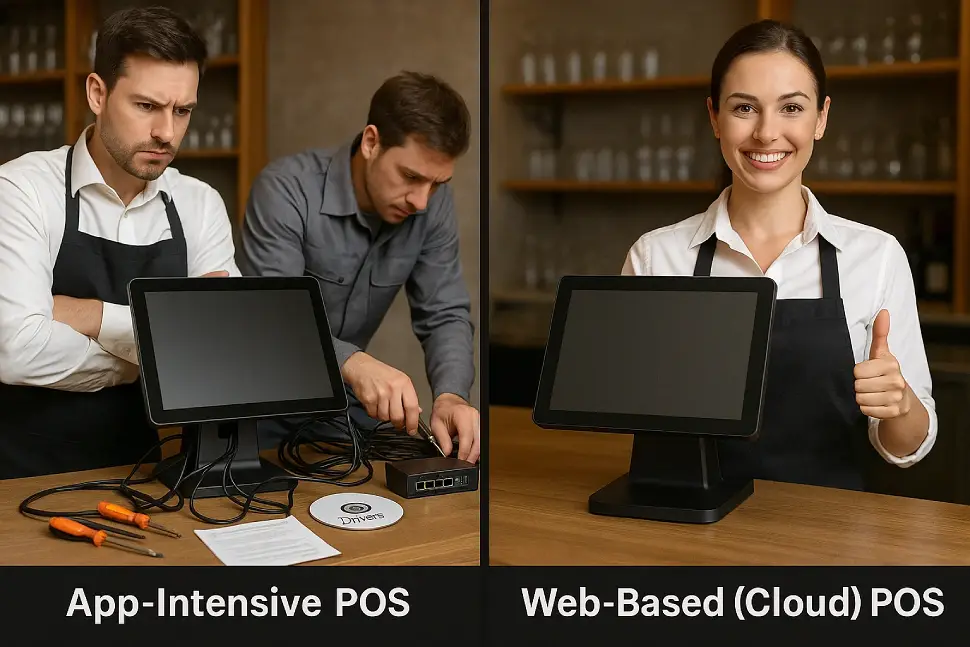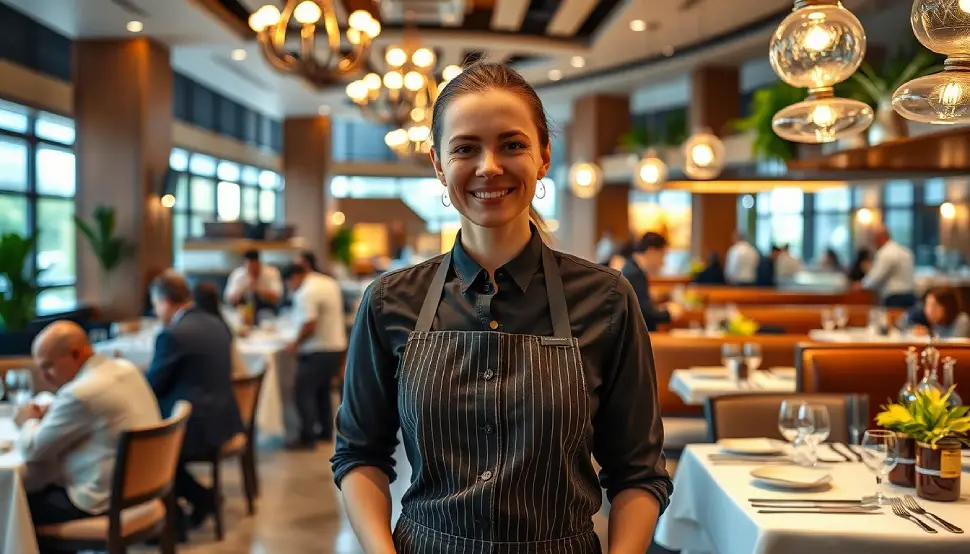The Best POS System for Hospitality – Features and Tips
By Alexander -
Apr 22, 2025
- 9 minutes read

POS System for Hospitality: Everything You Need to Know for a Smart Transition
Are you in the hospitality industry and want to work faster, easier, and error-free?
Then a reliable hospitality POS system isn't a luxury but a necessity for you.
Whether you run a café, restaurant, lunchroom, snackbar, or hotel, the right software gives you control over your business again.
This article will walk you through the essentials of what a modern POS system is for the hospitality industry.
We'll also explain why it's important, what to consider, and what the ultimate benefits are.
What is a POS System?
A POS system is more than just a cash drawer that stores money or prints receipts from a POS printer.
It's a digital tool that helps you with:
For daily operations, a touchscreen is usually used along with POS printers and credit card machines.
Who is a POS System for?
A good POS system is suitable for any type of hospitality business.
Think of:
Staff present?
You want to work quickly and as error-free as possible.
Easy employee training is important, so freelancers and temporary staff can quickly learn to use the system.
Are you self-employed?
You want as much oversight as possible and the convenience of a POS system.
In both scenarios, a POS system always helps you move forward!
Then a reliable hospitality POS system isn't a luxury but a necessity for you.
Whether you run a café, restaurant, lunchroom, snackbar, or hotel, the right software gives you control over your business again.
This article will walk you through the essentials of what a modern POS system is for the hospitality industry.
We'll also explain why it's important, what to consider, and what the ultimate benefits are.
What is a POS System?
A POS system is more than just a cash drawer that stores money or prints receipts from a POS printer.
It's a digital tool that helps you with:
- Taking orders.
- Processing payments like credit card, cash, or on account.
- Printing receipts and invoices.
- Managing inventory of items.
- Managing tables.
- Viewing reports and statistics.
For daily operations, a touchscreen is usually used along with POS printers and credit card machines.
Who is a POS System for?
A good POS system is suitable for any type of hospitality business.
Think of:
- Restaurants
- Cafés
- Bars
- Lunchrooms
- Snackbars
- Hotels
- Takeaway and delivery services
Staff present?
You want to work quickly and as error-free as possible.
Easy employee training is important, so freelancers and temporary staff can quickly learn to use the system.
Are you self-employed?
You want as much oversight as possible and the convenience of a POS system.
In both scenarios, a POS system always helps you move forward!

Almost every sector in hospitality needs a POS system. Photo Illustration: © HRC DIGITAL B.V.
What Are the Benefits of a Modern POS System?
A modern POS system for hospitality not only provides speed and convenience but also offers clarity, efficiency, and better control over your business.
Here are the main advantages explained in detail:
1. Faster Order Processing
2. Fewer Errors, More Efficiency
3. Clear Overview
4. Easy Management and Performance Insight
5. Better Customer Service
In summary, a modern POS system for hospitality ensures your business runs more smoothly, significantly reduces errors, and sends your customers home satisfied.
Here are the main advantages explained in detail:
1. Faster Order Processing
- Orders are quickly and directly entered via one central screen.
- Service runs smoother as staff don’t waste time deciphering handwritten notes.
- Automatic links to your kitchen printer, bar printer, and/or pickup window printer.
2. Fewer Errors, More Efficiency
- Staff make fewer mistakes as orders are entered digitally.
- All orders are immediately visible, complete, and clear to everyone.
- No forgotten drinks, dishes, or special requests as the POS system specifies what needs to be done.
- Inventory management, tables, reservations, and payments.
- All system functions are interconnected.
3. Clear Overview
- Every part of an order is centrally accessible.
- You can see what’s sold, which tables are still open, and how much tip was given, for example.
- Better communication between kitchen, service, and bar.
- No more hassle with loose notes, unclear texts, or misunderstandings among staff.
4. Easy Management and Performance Insight
- Real-time overview of revenue, inventory, and popular products.
- Instant insight into staff performance and sales statistics.
- Better planning possible thanks to clear data and reports.
- You have control over the numbers and your inventory.
- At the end of the day, you see exactly what happened.
- You know which products are doing well, your revenue, and how busy it was per hour or day.
- With a so-called Z-Report, you make a cut-off of revenue and payments for a period.
- Usually, this is for a day but can, of course, extend into the night.
5. Better Customer Service
- Your staff can assist guests more quickly, with more time for guests.
- Faster service leads to happier customers.
- Fewer errors mean fewer complaints and better reviews.
- Options for easy payment, like contactless and split bills, increase guest comfort.
- A POS system boosts customer satisfaction and the chance that guests will return.
In summary, a modern POS system for hospitality ensures your business runs more smoothly, significantly reduces errors, and sends your customers home satisfied.

Creating an order with guests - Photo Illustration: © HRC DIGITAL B.V.
What to Expect from a Good POS System?
Modern hospitality POS systems are often cloud-based and work across multiple devices simultaneously.
Some systems offer a hybrid function, allowing both local (on-premises) and cloud operations.
With continuous synchronization, everything eventually aligns in the cloud system, so all views are correct.
Here are some key points to consider:
Touchscreen and Mobile Use
Integration with Receipt and Kitchen Printers
Credit Card Terminal Integration
Tap to Pay Integration
On-Account Integration
Table Management
Reservation Function
Inventory Management
Link with Kitchen or Bar Displays
User Rights and Staff Registration
Some systems offer a hybrid function, allowing both local (on-premises) and cloud operations.
With continuous synchronization, everything eventually aligns in the cloud system, so all views are correct.
Here are some key points to consider:
Touchscreen and Mobile Use
- The system should work quickly and intuitively, even on tablets or smartphones.
- This way, you can use the POS system anywhere.
Integration with Receipt and Kitchen Printers
- Orders go directly to the right place: bar, kitchen, or counter.
- Misunderstandings are minimized.
Credit Card Terminal Integration
- Fast payments, no duplicate entries.
- Your system communicates with the card machine, the customer pays, and you're done.
Tap to Pay Integration
- Guests can easily pay at the table via Tap to Pay.
- This is a smartphone app usable everywhere.
- A nice bonus is that monthly costs are low, and you can use your own smartphone if it has a built-in NFC reader.
On-Account Integration
- For regular guests, it's often a given that they can order on account.
- Selecting the guest and charging to account should be easy and not tied to a fixed period.
- Also, when the guest settles the bill, it should be seamless.
Table Management
- You see exactly which tables are occupied, reserved, and what has been ordered.
- This is convenient for service and planning.
Reservation Function
- Guests can reserve online via your website.
- You retain the overview. Very handy for quiet periods and peak times.
Inventory Management
- Despite automation, "back of napkin" calculations still work for some entrepreneurs.
- But keeping track of many different products is often challenging or time-consuming.
- Especially for items that are costly and/or have a limited shelf life.
- In such cases, a form of inventory management is very useful. It prevents shortages and waste.
- Some systems automatically adjust inventory with each sale.
Link with Kitchen or Bar Displays
- Instead of paper receipts, you can work with a digital screen.
- Everything is in order, no searching, always up-to-date.
- Of course, this system also has drawbacks like hygiene since the screen is continuously touched.
- It's a personal choice how you want to work considering hygiene rules.
User Rights and Staff Registration
- You determine who has access to certain information and what actions can be performed within the system.
- You register hours, breaks, and see exactly who sold what.

Order quickly and conveniently - Photo Illustration: © HRC DIGITAL B.V.
What Do I Need for a POS System?
What you need for a POS system depends significantly on the system setup.
Generally, POS systems can be divided into two types:
1. App-intensive POS Systems
App-intensive POS systems use software specifically developed for certain operating systems like Android, iOS, or Windows. This software must be installed on each device and regularly updated. Data storage is usually local or cloud-based. Due to stricter requirements from app stores, modern hardware is required for these systems. You also need to consider the installation and maintenance of printer drivers and network systems, which adds extra costs and management.
Summary
2. Web-based POS Systems (Cloud-based)
Web-based POS systems operate entirely from a browser and are not software-intensive. Thus, they don't rely on a specific operating system. Even older PCs, simple Android boxes, or Raspberry Pi can work perfectly with these POS systems. Web-based systems control POS printers via cloud connections (like MQTT, HTTP, or sockets). These printers don't require separate drivers, making installation and maintenance much simpler. Moreover, little network management is needed as there’s simply less to manage.
Summary
Generally, POS systems can be divided into two types:
- App-intensive POS Systems
- Web-based POS Systems (Cloud-based)
1. App-intensive POS Systems
App-intensive POS systems use software specifically developed for certain operating systems like Android, iOS, or Windows. This software must be installed on each device and regularly updated. Data storage is usually local or cloud-based. Due to stricter requirements from app stores, modern hardware is required for these systems. You also need to consider the installation and maintenance of printer drivers and network systems, which adds extra costs and management.
Summary
- Expensive hardware
- Limited choice in operating systems
- Dependence on app stores
- Specific POS printers (with drivers)
- Extra costs: specialist help for printer installation and maintenance
- Extra costs: specialist help for network management
- Internet connection required
2. Web-based POS Systems (Cloud-based)
Web-based POS systems operate entirely from a browser and are not software-intensive. Thus, they don't rely on a specific operating system. Even older PCs, simple Android boxes, or Raspberry Pi can work perfectly with these POS systems. Web-based systems control POS printers via cloud connections (like MQTT, HTTP, or sockets). These printers don't require separate drivers, making installation and maintenance much simpler. Moreover, little network management is needed as there’s simply less to manage.
Summary
- Inexpensive hardware
- Only a browser needed (OS independent)
- Cloud-POS printers without driver installation
- No specialist network manager needed
- Internet connection required

On-premises, App based, web-based. Plenty of options. - Photo Illustration: © HRC DIGITAL B.V.
Why Switch to a New POS System?
Perhaps you're still using an outdated system or are managing everything with pen, paper, and separate card transactions.
It works, but it takes time, causes stress, and leads to mistakes.
Or you're looking for a more affordable system that works as well as or even better than your current POS system.
A new POS for hospitality:
It ensures that you and your team can do what you excel at: working efficiently and delivering great service!
What Should You Consider When Buying?
Flexibility
Service and Support
Integrations
Costs
The Future
A good POS system is a smart investment
The right POS system reduces errors, speeds up service, and gives you more control over your business. Whether you're just starting out or have been running for years, switching to a modern system is always a step forward.
Grow Along
Do you want a POS system that thinks with you, grows with you, and makes your work easier? Then it's time to look beyond just a POS for hospitality and opt for a smart, all-encompassing solution.
It works, but it takes time, causes stress, and leads to mistakes.
Or you're looking for a more affordable system that works as well as or even better than your current POS system.
A new POS for hospitality:
- Works faster
- Makes your work more organized
- Helps you grow
- Provides peace during busy times
It ensures that you and your team can do what you excel at: working efficiently and delivering great service!
What Should You Consider When Buying?
- User-friendliness
- Choose a system that's easy to use, so you don't waste valuable time on endless training.
Flexibility
- Can it grow with your business?
- New locations or additional features?
- Wishlist?
Service and Support
- Is support available when something goes wrong?
- Is the supplier available in emergencies during your busy times?
Integrations
- Does the system work with your card terminal, kitchen printer, reservation system, and accounting?
Costs
- Look at the total cost, not just the purchase price. Consider monthly fees, support, and updates.
The Future
- Everything revolves around data and convenience, and modern POS systems are advancing further.
- Think of AI reports, automatic suggestions, and even voice-controlled ordering. All designed to save you time and increase your revenue.
A good POS system is a smart investment
The right POS system reduces errors, speeds up service, and gives you more control over your business. Whether you're just starting out or have been running for years, switching to a modern system is always a step forward.
Grow Along
Do you want a POS system that thinks with you, grows with you, and makes your work easier? Then it's time to look beyond just a POS for hospitality and opt for a smart, all-encompassing solution.

A satisfied hospitality manager. - Photo Illustration: © HRC DIGITAL B.V.